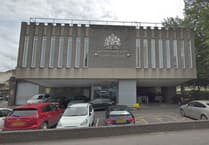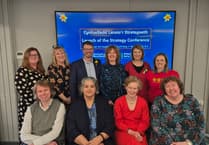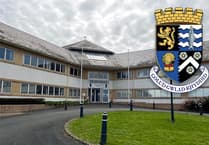Historical society
WHEN people think of the campaign for votes for women they tend to think of the militant suffragettes led by Emmeline Pankhurst, who disrupted meetings, chained themselves to railings, smashed shop windows and set fire to pillar boxes and houses. However, as Dr Neil Evans explained in his talk on suffragettes in Wales held, appropriately, on International Women’s Day, there was another branch of the movement which few people are aware of and which arguably had a much greater influence in securing votes for women. In Britain, there were never more than 2,500 militant suffragettes, members of the Women’s Social and Political Union. There were 50,000 members of the non-militant National Union of Women’s Suffrage Societies, now known as the suffragists, who pre-dated the WSPU. They were led by Millicent Garrett Fawcett. By 1912-13 three suffrage bills had been rejected by Parliament. Each time, an effort failed the militant suffragettes became increasingly more violent particularly against politicians such as the Chancellor of the Exchequor, David Lloyd George, ironically, a supporter of votes for women. He was heckled at the Wrexham Eisteddfod and the Chairing ceremony was disrupted. Violent demonstrations occurred in Llanystumdwy culminating in attacks on the suffragettes by local people. In response, the NUWSS sought to counter what they considered the baleful effects of the militants and maintain the morale of the suffrage movement. They organised a nationwide pilgrimage to London in July 1913, from various points in the UK, which would take the message to new areas and demonstrate the strength of the movement. The appeal was not to force, but to the hearts and consciences of both men and women.In north Wales, Edith Agnes Eskrigge from Lancashire organised the pilgrimage. Marchers from Anglesey, Criccieth and other points in the area joined together at Tan yr Allt Reformers Tree in Bangor to begin the march. After holding a rally at Gladstone’s monument in Llanfairfechan and in Colwyn Bay complete with the town band, the 150 marchers proceeded to Stoke. There, they joined a contingent from the north-west and proceeded along the Watling Street route to London. The march took a month and people came and went as they could. Charlotte Price White was one of only two who marched the whole way from Bangor. When war came the following year all factions of the women’s suffrage movement suspended their activities and threw themselves into the war effort working in munitions and other industry in jobs normally undertaken by men. Not only did this engender admi-ration; it also promoted their case for equal treatment. Their efforts finally brought results. In 1918 ,the vote was extended to men over 21 and women over 30. Finally, in 1928 all women over 21 were enfranchised. Dr Evans’ talk was enthusiastically received by an attentive and appreciative audience.
Rock and blues evening
ON FRIDAY, 4 March, Harlech was treated to an evening of music by Ysgard —Ysgol Harlech Rock & Blues band.The band performed for the full evening on the stage of Neuadd Goffa. Members of the band were included Alaw and Cerys Sharp, Gwion Lloyd, Rhys Jones and Erin Ward (brass section); Dafydd Hughes (piano and vocals); Tirion Evans (guitar); Oscar Fields (Bass Guitar); Miki Adamkiewicz (percussion); and Max Ligget (drums). On euphonium was Elfin Anwyl and on saxophone was Mr Einion Dafydd, head of music at the school. The evening was raising money for Harlech & Ardudwy Leisure Centre.Ysgard will be performing again on stage at the Rock Ardudwy Festival in Harlech on Saturday, 11 June.
Leisure Centre
HARLECH & Ardudwy Leisure Centre is offering free swimming to children on Saturdays. The centre will be open from 10am to 2pm.This initiative has been supported by a health & well-being grant fund from Snowdonia National Park.





Comments
This article has no comments yet. Be the first to leave a comment.